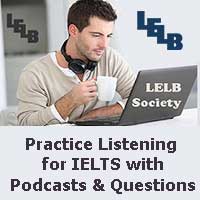IELTS Listening Practice Growth Mindset
IELTS Listening Practice Growth Mindset
About this activity
- This activity is labeled round table by Dr. Hariri, the creator and administrator of LELB Society.
- This activity is on the premise of Flipped Learning, according to which the students watch a video before the class, carry out research into the selected theme, and prepare themselves for an informed discussion in the class.
- This activity is on the basis of both synchronous and asynchronous computer-mediated communication (CMC), according to which the students are also encouraged to be active even before the class.
- In this flipped classroom activity, the students are encouraged to utilize the comment form at the bottom of the post to to exchange their questions, findings, and experiences with each other. Later on, we will discuss the asynchronous activities in the class. In a few words, “let’s learn from each other.”
About the Video Files
- The video files are meticulously selected among the most prominent academicians, lecturers, and scientists based on Google Scholar.
- We might refer to the exact elapsed time ⌛️ of the video files to pinpoint specific statements, messages, etc.
Writing Activity
- You should adopt a formal register in your written contributions in the comment form.
- To give an answer to a question or comment, use the Reply button.
- In our written activities, we can practice negotiation of meaning (sharing our findings with regard to the selected themes) and negotiation of form (performing peer-reviewed error correction).
- Put a number before your questions in the comment form successively to refer to them more easily in the class.
- Your questions should be unique and not previously raised by your classmates in the comment form.
Expectations
- You should take equal turns in speaking. The maximum amount of time you can have is 60 seconds.
- This is a fully organized activity; consequently, all your contributions, including comments, replies, and verbal opinions, must be with direct reference to the assigned topic and its corresponding video. Any irrelevant contribution is strongly frowned upon.
- You will be stopped if your speech appears to be irrelevant or not supported by evidence.
- Students leaving comments below will be given priority over others in our informed conversations.




8. Frankly, during her lecture, I found her smiling almost artificial. What is your standpoint about it?
7. What is the meaning of equality? [Time 5:40]
6. Is praising talent an appropriate method for encouraging children to be more industrious? Why?
5. How is the effect of neurons on learning?
4. How can we change students’ mindsets directly?
3. What’s the meaning of resilience? [Time: 3:53]
2. How are the power of yet and a growing mindset closely intertwined with each other?
1. What was so encouraging about that high school curriculum in Chicago?